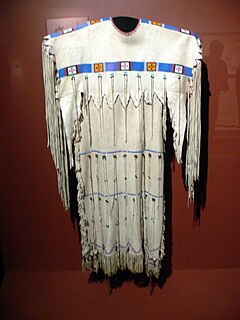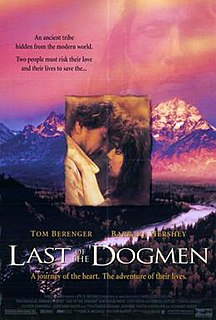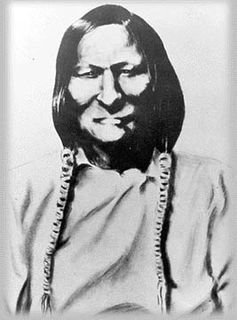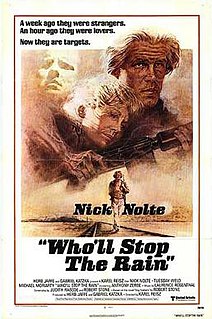Alien primarily refers to:

The Arapaho are a Native American people historically living on the plains of Colorado and Wyoming. They were close allies of the Cheyenne tribe and loosely aligned with the Lakota and Dakota.

The Cheyenne are one of the indigenous people of the Great Plains whose language is of the Algonquian language family. The Cheyenne comprise two Native American tribes, the Só'taeo'o or Só'taétaneo'o and the Tsétsêhéstâhese. These tribes merged in the early 19th century. Today, the Cheyenne people are split into two federally recognized Nations: the Southern Cheyenne, who are enrolled in the Cheyenne and Arapaho Tribes in Oklahoma, and the Northern Cheyenne, who are enrolled in the Northern Cheyenne Tribe of the Northern Cheyenne Indian Reservation in Montana.

The Sand Creek massacre was a massacre of Cheyenne and Arapaho people by the U.S. Army in the American Indian Wars that occurred on November 29, 1864, when a 675-man force of the Third Colorado Cavalry under the command of U.S. Volunteers Colonel John Chivington attacked and destroyed a village of Cheyenne and Arapaho people in southeastern Colorado Territory, killing and mutilating an estimated 70 to 500 Native American people, about two-thirds of whom were women and children. The location has been designated the Sand Creek Massacre National Historic Site and is administered by the National Park Service. This was part of a series of events known as the Colorado War and was preceded by the Hungate massacre.
Fighter(s) or The Fighter(s) may refer to:

Last of the Dogmen is a 1995 American Western adventure film written and directed by Tab Murphy. It stars Tom Berenger, Barbara Hershey, Kurtwood Smith, and Steve Reevis. Set in the mountains of northwest Montana, near the Idaho and Canadian borders, the film is about a bounty hunter who tracks escaped convicts into a remote region and encounters an unknown band of Dog Soldiers from a tribe of Cheyenne Indians. The film was shot on location in Alberta and British Columbia, Canada, as well as in Mexico.

Black Kettle was a prominent leader of the Southern Cheyenne during the American Indian Wars. Born to the Northern Só'taeo'o / Só'taétaneo'o band of the Northern Cheyenne in the Black Hills of present-day South Dakota, he later married into the Wotápio / Wutapai band of the Southern Cheyenne.

The Dog Soldiers or Dog Men are historically one of six Cheyenne military societies. Beginning in the late 1830s, this society evolved into a separate, militaristic band that played a dominant role in Cheyenne resistance to the westward expansion of the United States in the area of present-day Kansas, Nebraska, Colorado, and Wyoming, where the Cheyenne had settled in the early nineteenth century.

The Battle of Washita River occurred on November 27, 1868, when Lt. Col. George Armstrong Custer's 7th U.S. Cavalry attacked Black Kettle's Southern Cheyenne camp on the Washita River.
An orchid is a member of the flowering plant family Orchidaceae.

The Colorado War was an Indian War fought in 1864 and 1865 between the Southern Cheyenne, Arapaho, and allied Brulé and Oglala Sioux peoples versus the U.S. army, Colorado militia, and white settlers in Colorado Territory and adjacent regions. The Kiowa and the Comanche played a minor role in actions that occurred in the southern part of the Territory along the Arkansas River. The Cheyenne, Arapaho, and Sioux played the major role in actions that occurred north of the Arkansas River and along the South Platte River, the Great Platte River Road, and the eastern portion of the Overland Trail. The United States government and Colorado Territory authorities participated through the 1st Colorado Cavalry Regiment, often called the Colorado volunteers. The war was centered on the Colorado Eastern Plains, extending eastward into Kansas and Nebraska.
Stoner or stoners may refer to:
A still life is a work of art depicting inanimate subject matter.

Gall, Lakota Phizí, was a battle leader of the Hunkpapa Lakota in the long war against the United States. He was also one of the commanders in the Battle of Little Bighorn.
A dog is a domesticated canid species, Canis lupus familiaris.
A soldier is a person who has enlisted with, or has been conscripted into, a country's armed forces.

Who'll Stop the Rain is a 1978 American war film directed by Karel Reisz and starring Nick Nolte, Tuesday Weld, Michael Moriarty, and Anthony Zerbe. It was released by United Artists and produced by Herb Jaffe and Gabriel Katzka with Sheldon Schrager and Roger Spottiswoode as executive producers. The screenplay was by Judith Rascoe and Robert Stone, based on Stone's novel Dog Soldiers (1974), the music score by Laurence Rosenthal, and the cinematography by Richard H. Kline. The movie was entered in the 1978 Cannes Film Festival.
George Armstrong Custer (1839–1876) was a United States Army cavalry commander in the American Civil War and the Indian Wars. He was defeated and killed by the Lakota, Northern Cheyenne, and Arapaho tribes at the Battle of the Little Bighorn. More than 30 movies and countless television shows have featured him as a character. He was portrayed by future U.S. president, Ronald Reagan in Santa Fe Trail (1940), as well as by Errol Flynn in They Died With Their Boots On (1941).
The Council of Forty-four is one of the two central institutions of traditional Cheyenne Indian tribal governance, the other being the military societies such as the Dog Soldiers.
This page is based on this
Wikipedia article Text is available under the
CC BY-SA 4.0 license; additional terms may apply.
Images, videos and audio are available under their respective licenses.









